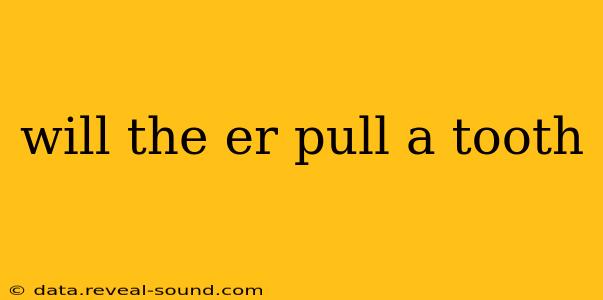Will the ER Pull a Tooth? Understanding Emergency Dental Care
The short answer is: sometimes. Emergency rooms (ERs) are designed to handle life-threatening situations. While they might address some dental emergencies, they aren't equipped or staffed to provide comprehensive dental care. Whether or not they'll pull a tooth depends entirely on the specific circumstances.
Let's break down when an ER might extract a tooth and when it's better to seek a dentist or oral surgeon.
When Might an ER Pull a Tooth?
ERs will generally only extract a tooth in cases of a severe, life-threatening emergency. This often involves situations where:
- Severe Trauma: A significant injury to the mouth, like a car accident, resulting in a severely damaged or dislodged tooth. The focus here is on managing the immediate injury and preventing further complications, such as infection or uncontrolled bleeding.
- Severe Infection: A severely infected tooth that's causing a spreading infection (cellulitis) that threatens surrounding tissues or poses a risk of sepsis. In this instance, tooth extraction may be necessary to control the infection.
- Significant Bleeding: Uncontrollable bleeding from a dental injury. The ER will prioritize stopping the bleeding before considering other treatments.
It's crucial to remember that even in these emergency situations, the ER's primary goal is to stabilize the patient. They may perform a temporary extraction, but they won't provide the same level of care as a dentist or oral surgeon.
When Should You NOT Go to the ER for a Toothache?
For most dental issues, the ER is not the appropriate place to seek care. These include:
- Routine Toothaches: A general toothache, pain from a cavity, or sensitivity to hot/cold is best addressed by a dentist.
- Loose Teeth (without trauma): Unless accompanied by severe bleeding or infection, a loose tooth not caused by trauma is typically handled by a dentist.
- Broken or Chipped Teeth (without significant bleeding): Minor damage to a tooth is usually managed by a dentist for restoration and repair.
- Abscesses (without severe systemic symptoms): While an abscess is serious, if it's not causing widespread infection or severe pain, a dentist is the best resource.
What Happens if You Go to the ER for a Non-Emergency Dental Problem?
You'll likely be examined, but the ER staff will likely refer you to a dentist or oral surgeon for appropriate treatment. You'll still face an emergency room bill for the visit, potentially a significant expense for a non-emergency issue.
What's the Best Course of Action for a Dental Emergency?
The best approach is to contact a dentist or oral surgeon first. Many dental practices offer emergency services, and they have the expertise and equipment to handle most dental emergencies effectively and efficiently. If you cannot reach a dentist and are experiencing a life-threatening emergency (severe bleeding, spreading infection, etc.), then the ER is the appropriate place to go.
How to Find an Emergency Dentist?
Many dental associations have online directories to help locate emergency dental services. You can also search online for "emergency dentist near me" to find local options.
Remember: Prevention is key. Regular dental check-ups and good oral hygiene are essential to avoid dental emergencies.
